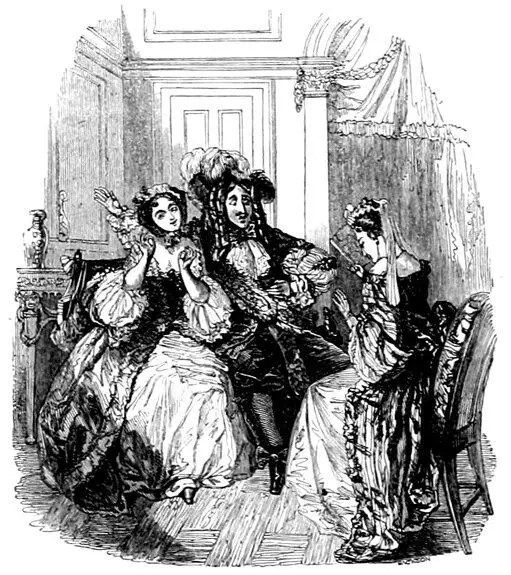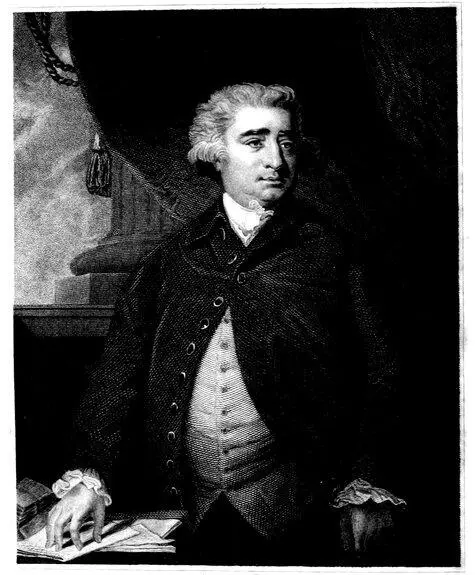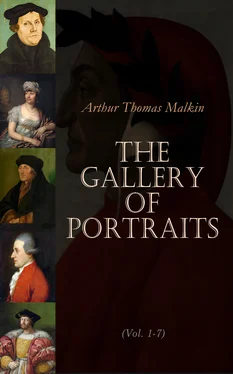The subject of that excellent comedy, Les Femmes Savantes, in which the ridicule is kept within reasonable bounds, and female faults and virtues are painted with a proper gradation of colouring, where what the painters call a medium tint harmonizes the extremes of light and shade, was taken up by Goldoni with that coarse and abrupt pencilling of black and white, which has always been the vice of the Italian stage. It has indeed been advanced as a reproach to Moliere, that he too often charged his comic pictures with the extravagance of caricature: but if we compare even the most farcical of his scenes with the speaking pantomimes and half-improvisations of Italy, we must pronounce him a model of delicacy and classical propriety.
His last comedy was Le Malade Imaginaire. It was acted for the fourth time on the 17th February, 1673. The principal character represented is that of a sick man, who, to carry on a purpose of the plot, pretends to be dead. This part was played by Moliere himself. The popular story was, that when he was to discover that it was only a feint, he could neither speak nor get up, being actually dead. The wits and epigrammatists made the most of the occurrence; those who could not write good French, treated it with bad Latin. But unluckily for the stability of their conceits, they were not built on the foundation of truth. Though very ill, and obviously in much pain, he was able to finish the play. He went home, and was put to bed: his cough increased violently; a vessel burst in his lungs, and he was suffocated with blood in about half an hour after. He was only in his fifty-second year when this event took place. The King was extremely affected at this sudden loss, by which, as Johnson said of Garrick, the gaiety of nations was eclipsed; and as a strong mark of his regard, he prevailed with the archbishop of Paris to allow of his being interred in consecrated ground. Nothing short of so absolute a King’s interposition could have effected this; for, independently of the general sentence of excommunication then in force against scenic performers, Moliere had drawn upon himself the resentment of the ecclesiastics in particular, by exposing the hypocrites of their cloth, as well as the bigots among the laity. Those who ridicule folly and knavery in all orders of men must expect to be treated as Moliere was, and to have the foolish and knavish of all orders for enemies. During his life, Paris and the court were stirred up and inflamed against the dramatist; and on more than one occasion, he must have fallen a sacrifice to the indignation of the clergy, had he not been protected by the King. The friend of his life did not desert him when he was dead; but procured for his insensible remains that decent respect, which all nations have consented to pay, as a tribute even to themselves.
Voltaire characterizes Moliere as the best comic poet of any nation; and treats the posthumous hostility which made a difficulty about his burial as a reproach both to France and to the Catholic religion. Professing to have reperused the comedians of antiquity for the purpose of comparison, he gives it as his judgment, that the French dramatist is entitled to the preference. He grounds this decision on the art and regularity of the modern theatre, contrasted with the unconnected scenes of the ancients, their weak intrigues, and the strange practice of declaring by the mouths of the actors, in cold and unnatural monologues, what they had done and what they intended to do. He concludes by saying that Moliere did for comedy what Corneille had done for tragedy; and that the French were superior on this ground to all the people upon earth. A country possessing such a comic drama as ours, throughout the course of about two centuries, with Much ado about Nothing at one end of the list, and The School for Scandal at the other, will be inclined to demur to this broad national assumption: but we, in our turn, must in candour confess, that though the chronological precedence of Shakspeare, Jonson, Fletcher, Massinger, and Ford, had established a glorious stage for us before Moliere was born, or while he was yet in petticoats; yet our most eminent comic writers in the reigns of William III., Anne, and George I., drank deep and often from the abundant source of French comedy. But Moliere’s influence was most beneficially exerted in reclaiming his countrymen from a fondness for such Italian conceits as ringing the changes upon odours and ardours , &c., to which authors like Scudery, Voiture, and Balzac had given an ephemeral fashion. Boileau and Moliere principally contributed to arm the French against the invasion from beyond the Alps, of such madrigal-writers as Marini, Achillini, and Préti.
It is not true that Moliere, when he commenced his career, found the theatre absolutely destitute of good comedies. Corneille had already produced Le Menteur, a piece combining character with intrigue, imported from the Spanish stage. Moliere had produced only two of his most esteemed plays, when the public was gratified with La Mère Coquette of Quinault, than which few pieces were more happy either in point of character or intrigue. But if Corneille be the first legitimate model for tragedy, Moliere was so for comedy. The general shaping of his plots, the connexion of his scenes, his dramatic consistency and propriety were attempted to be copied by succeeding writers: but who could compete with him in wit and spirit? His well-directed attacks did more than any thing to rescue the public from the impertinence of subaltern courtiers affecting airs of importance; from the affectation of conceited, and the pedantry of learned, ladies; from the quackery of professional costume and barbarous Latin on the part of the medical tribe. Moliere was the legislator of conventional proprieties. That period might well be called the Augustan age of France, which saw the tragedies of Corneille and Racine; the comedies of Moliere; the birth of modern music in the symphonies of Lulli; the pulpit eloquence of Bossuet and Bourdaloüe. Louis XIV. was the hearer and the patron of all these; and his taste was duly appreciated and adopted by the accomplished Madame, by a Condé, a Turenne, and a Colbert, followed by a long train of eminent men in every department of the state and of society.
Little has come down to us respecting Moliere’s personal history or habits, excepting that his marriage was not among the happy or creditable events of his life. So little did he in his own case weigh the evils of disproportioned age, however sarcastically he might imagine them in fictitious scenes, that he took for his partner the daughter of La Béjard, the associate of his strolling career. If his choice were a fault, it carried its punishment along with it. He was very jealous, and the young lady was an accomplished coquette. The bickerings of married life were the frequent and successful topics of his comedies; and his enemies asserted, that in drawing such scenes, he possessed the advantage of painting from the life. Of that ridicule which had so often set the theatre in a roar, he was himself the serious subject, the repentant and writhing victim.
Fuller accounts of Moliere are to be found prefixed to the best editions of his works: we may mention those of Joly, Petitot, and Auger. An article of considerable length, by the last-named author, is devoted to our poet in the Biographie Universelle.

Scene from Les Précieuses Ridicules.

Engraved by I. W. Cook. CHARLES JAMES FOX. From a Picture by Sir Joshua Reynolds in the possession of Lord Holland. Under the Superintendance of the Society for the Diffusion of Useful Knowledge. London. Published by Charles Knight, Pall Mall East.
Читать дальше














